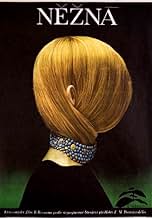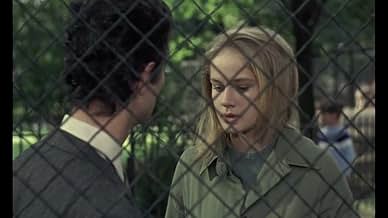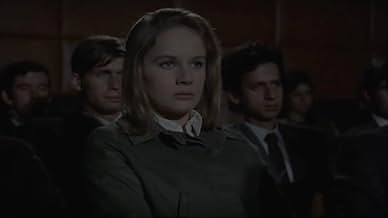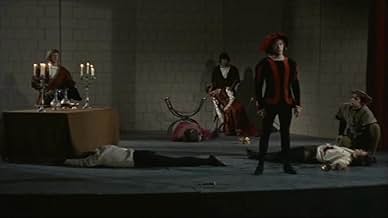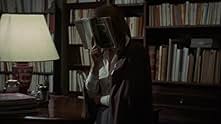Une femme douce
- 1969
- Tous publics
- 1h 28m
A young woman kills herself, leaving no explanation to her grief-stricken pawnbroker husband. We learn in flashback about how they met, married, and how she failed to adapt her lifestyle to ... Read allA young woman kills herself, leaving no explanation to her grief-stricken pawnbroker husband. We learn in flashback about how they met, married, and how she failed to adapt her lifestyle to his. Disgusted with his attempts to dominate her, she considered murdering him, but found ... Read allA young woman kills herself, leaving no explanation to her grief-stricken pawnbroker husband. We learn in flashback about how they met, married, and how she failed to adapt her lifestyle to his. Disgusted with his attempts to dominate her, she considered murdering him, but found herself unable to do it.
- Director
- Writers
- Stars
- Awards
- 1 win total
- Director
- Writers
- All cast & crew
- Production, box office & more at IMDbPro
Featured reviews
A Gentle Woman leans more to searching for common sense where there is none: Elle is a simple girl in a family that doesn't treat her well (we don't see this, we just hear it second-hand), and has a gentle quality (or 'meek' as Dostoyevsky's story was originally titled) that somehow allures Luc, who works as a pawnbroker. He pursues her, even though she's not much interested in his advances ("I told you not to follow me," she says to him as he follows her up to his house, in a tone soft but firm). He marries her. They seem momentarily at peace, but this soon breaks: Luc is continually insecure with himself, in a sense, because he can never feel secure in his relationship. Unlike That Obscure Object of Desire, where there was a mind-game involving the sex in the possessive relationship, there's no question that they do go to bed. It's the whole factor of what's really there in terms of trust, love, redemption, and above all a connection between two people. A scene that could be in a silent film (a form Bresson desperately would love to have tried), the couple are watching a film in a theater, and she is sitting next to a guy on her other side. Luc can't stand this, and almost on instinct he stands so the two can switch. A glance, or a couple of glances, speak a thousand ideas in a Bresson film.
In fact it's Bresson's attempts, as in other films, to try and intellectualize an emotional downward spiral that gains interest. Because it's the opposite of your usual melodrama, where the characters get all excited and angry and yelling and lots of misunderstandings and so on, the style is stripped down, leading to what is a much more distressing relationship they're in. Neither one can give in, but Elle just can't seem to leave him or go through an affair. And Luc likewise can't seem to ever go to lengths of domestic violence or on the flip-side leaving him. It's all about him having her, not the other way around, and the moments that she tries and asks him about his past doings (i.e. being fired from a bank teller job) he hesitates. There's a mold in shape that he can't seem to break of her, and by the time he goes for it and says over and over "I love you" it's clear as day- she's already past that point saying "I thought you were going to leave me." Enigmatic, maybe, it depends on the viewer.
It might be understandable this is one of Bresson's least available selections (no DVD yet, and a very paltry availability on the internet quarters of VHS sales), even though it shouldn't be. It's a fascinating experiment in dissecting character through narrative (albeit Bresson cuts back and forth between Luc at Elle's dead body at the bed a wee bit much through good narration from him), and in revealing little things about the relationship for a modern audience. There's a subtext I liked that dealt with diversions, theater, television, films, that are like little respites for the two of them (for Elle more-so, as we see with her interest in Hamlet). And, of course, the Catholic dimension of feeling- from Dostoyevsky carried over into Bresson- is felt more that almost any other of his films; divorce, it seems, is never called into question. This makes it dangerously close to being behind-the-times with its ultimately tragic fate for the characters.
But it also puts up an ultimatum of morality, not just for Luc but for Elle in hindsight: the film doesn't condone suicide, for all of the poetic splendor it's revealed in at the start and finish (not to mention that amazing final shot of the coffin being nailed in). Many interpretations, existential, feminist, even Marxist to a smaller extent, could be taken into account. One thing is for certain: A Gentle Woman isn't an easy film to digest, but for those willing to give it a shot it offers some intriguing layers beneath the subdued manner. By the way, watch for the scene that finally comes up that was taken for the (somewhat misleading) video cover; it's a total 180, aside from the basic initial physical motion, of a similar scene in Goodfellas!
Although the film is Bresson's first in color and perhaps more accessible than many of his films, it is also full of his typically enigmatic details and coincidences that may be clues to the fate of the characters. Like most of his films, the actors are non-professionals with the exception of Ms. Sanda and the performances are emotionally detached yet rich in nuance and body language and the overall experience is powerful and haunting. In flashback, we discover that her husband Luc is a pawnbroker and the two meet when she comes to his store to sell a crucifix. The distinction between her spiritual nature and his obsession with material things is apparent when he strips off the plastic statue of Jesus, keeping only the gold cross that he deems to be of some value.
Moved by her poverty and enamored with her striking features, he pays more than the cross is worth, but she returns it to him saying that she cannot be bought. Though he pursues her with determination, Elle at first resists. "You don't want love", she tells him. "You want me to agree to marry you." Luc insists that he can take her away from her sordid surroundings and provide her with a home, saying, "Say yes and you can leave here forever." And she at last agrees but it is clear from the beginning that the marriage is a mismatch and throughout the film, Bresson conveys a growing mood of claustrophobia and growing oppressiveness. Luc appeals to her spiritual nature by taking her to museums, operas, and plays and buying her phonograph records but there is something missing.
On the surface he loves her, but he is cold, humorless, and unable to understand or meet her deepest needs. On the other hand, Elle is withdrawn, given to long periods of silence, and makes little attempt to communicate her feelings. Indeed, she may be clinically depressed, but Bresson deals with people's problems in existential rather than psychological terms. "For myself", he has said, "there is something which makes suicide possible, almost inevitable the feeling of void which is impossible to bear." Perhaps Bresson views suicide, at least on one level, as an act of spiritual redemption and A Gentle Woman may have that implication, though the film is very much open to interpretation.
One day Elle picks up a gun and points it at Luc but cannot pull the trigger. Inevitably they fight over money and his jealousy surfaces when he discovers her sitting with a young man in a parked car, even though he hears her reject the man's advances. When she becomes ill, he is generous in providing treatment and the relationship seems to be moving in the right direction until, both fearful of intimacy and afraid of being alone, something within her snaps. Mentally confused or perhaps clear for the first time, she steps out onto the balcony and finds her way home.
Did you know
- TriviaRobert Bresson chose Dominique Sanda just as a result of her first voice call.
- Goofs(at about 18 minutes) Guy and Dominique swap places in their cinema seats before they are actually seen to do so in the final shot of that scene.
- ConnectionsFeatures Benjamin ou Les mémoires d'un puceau (1968)
- How long is A Gentle Woman?Powered by Alexa
Details
Box office
- Gross worldwide
- $2,356
- Runtime1 hour 28 minutes
- Sound mix
- Aspect ratio
- 1.66 : 1
Contribute to this page


